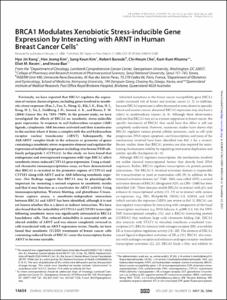KUMEL Repository
1. Journal Papers (연구논문)
1. School of Medicine (의과대학)
Dept. of Obstetrics & Gynecology (산부인과학)
BRCA1 Modulates Xenobiotic Stress-inducible Gene Expression by Interacting with ARNT in Human Breast Cancer Cells
- Affiliated Author(s)
- 조치흠
- Alternative Author(s)
- Cho, Chi Heum
- Journal Title
- Journal of Biological Chemistry
- ISSN
- 0021-9258
- Issued Date
- 2006
- Abstract
- Previously, we have reported that BRCA1 regulates the expression of various classes of genes, including genes involved in xenobiotic stress responses (Bae, I., Fan, S., Meng, Q., Rih, J. K., Kim, H. J., Kang, H. J., Xu, J., Goldberg, I. D., Jaiswal, A. K., and Rosen, E. M. (2004) Cancer Res. 64, 7893–7909). In the present study, we have investigated the effects of BRCA1 on xenobiotic stress-inducible gene expression. In response to aryl hydrocarbon receptor (AhR) ligands, cytoplasmic AhR becomes activated and then translocates to the nucleus where it forms a complex with the aryl hydrocarbon receptor nuclear translocator (ARNT). Subsequently, the AhR·ARNT complex binds to the enhancer or promoter of genes containing a xenobiotic stress-responsive element and regulates the expression of multiple target genes including cytochrome P450 subfamily polypeptide 1 (CYP1A1). In this study, we have found that endogenous and overexpressed exogenous wild-type BRCA1 affect xenobiotic stress-induced CYP1A1 gene expression. Using a standard chromatin immunoprecipitation assay, we have demonstrated that BRCA1 is recruited to the promoter regions of CYP1A1 and CYP1B1 along with ARNT and/or AhR following xenobiotic exposure. Our findings suggest that BRCA1 may be physiologically important for mounting a normal response to xenobiotic insults and that it may function as a coactivator for ARNT activity. Using immunoprecipitation, Western blotting, and glutathione S-transferase capture assays, a xenobiotic-independent interaction between BRCA1 and ARNT has been identified, although it is not yet known whether this is a direct or indirect interaction. We have also found that the inducibility of CYP1A1 and CYP1B1 transcripts following xenobiotic stress was significantly attenuated in BRCA1 knockdown cells. This reduced inducibility is associated with an altered stability of ARNT and was almost completely reversed in cells transfected with an ARNT expression vector. Finally, we have found that xenobiotic (TCDD) treatments of breast cancer cells containing reduced levels of BRCA1 cause the transcription factor ARNT to become unstable.
- Department
- Dept. of Obstetrics & Gynecology (산부인과학)
- Publisher
- School of Medicine
- Citation
- Hyo Jin Kang et al. (2006). BRCA1 Modulates Xenobiotic Stress-inducible Gene Expression by Interacting with ARNT in Human Breast Cancer Cells. Journal of Biological Chemistry, 281(21), 14654–14662. doi: 10.1074/jbc.M601613200
- Type
- Article
- ISSN
- 0021-9258
- Appears in Collections:
- 1. School of Medicine (의과대학) > Dept. of Obstetrics & Gynecology (산부인과학)
- 파일 목록
-
-
Download
 oak-aaa-2658.pdf
기타 데이터 / 609.58 kB / Adobe PDF
oak-aaa-2658.pdf
기타 데이터 / 609.58 kB / Adobe PDF
-
Items in Repository are protected by copyright, with all rights reserved, unless otherwise indicated.